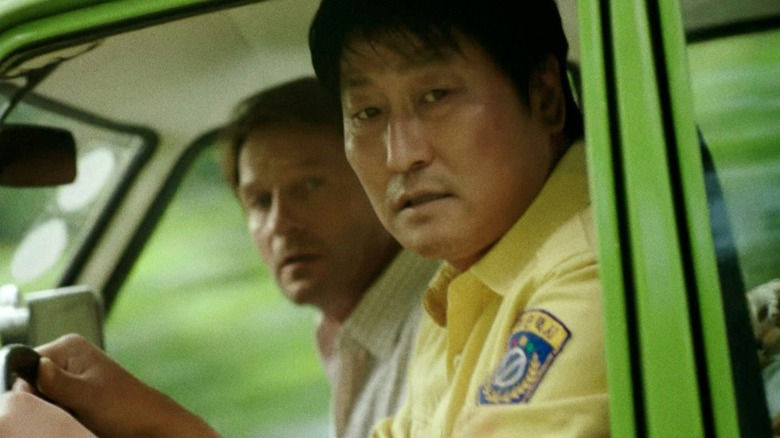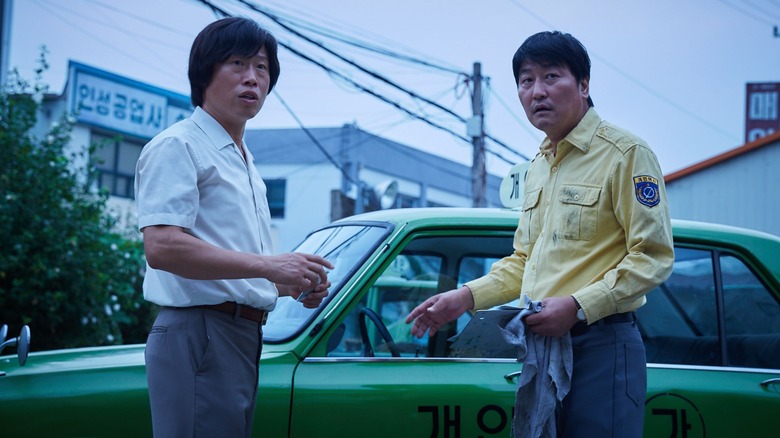
(Welcome to The Daily Stream, an ongoing series in which the /Film team shares what they've been watching, why it's worth checking out, and where you can stream it.)
The Movie: "A Taxi Driver"
Where You Can Stream It: Amazon Prime, Hoopla
The Pitch: Movies that attempt to cover such sensitive topics as a real-world massacre tend to be moody, unpleasant, and relentlessly grim. Not so with 2017's "A Taxi Driver," which couldn't possibly be more different from the usual (typically Oscar-bait) fare. This South Korean film chronicles the 1980 Gwangju Uprising, a momentous historical event that proved to be a significant stepping stone on the way to the nation's fight to get out from under the oppression of a brutal military coup.
Yet rather than put audiences through a torturous and one-note slog, "A Taxi Driver" grounds the proceedings in the surprisingly hilarious dynamic between taxi driver Kim Sa-bok and German reporter Jürgen Hinzpeter. The film creeps right up to the line of becoming "tonally jarring" when it switches from Mr. Kim's antics to the inevitably stomach-churning horrors of fascism on display -- a death knell for most movies, but a saving grace for this one.
Why It's Essential Viewing

When's the last time you watched a movie that began with its main character singing away to a pop song without a care in the world and ended as a gut-wrenching, tear-jerking rumination on the cost of freedom? Directed by Jang Hoon and written by Eom Yu-na, "A Taxi Driver" only betrays a more conventional approach with its bookends: an opening title card that quickly establishes the political backdrop of a particularly fraught moment in South Korean history and brief footage of a real-life figure portrayed in the film.
In between, we jump straight into an unassuming day in the life of Song Kang-ho's (a staple of Bong Joon-ho films like "Memories of Murder," "The Host," "Snowpiercer," and "Parasite") taxi driver, who's given far more complicated layers than one might expect. An army veteran and now a widower struggling to make ends meet, Kim is content to remain politically uninvolved -- even while stuck in traffic amid mass protests on the streets, glaring out the window as citizens speak out with one voice against the ongoing military coup. Though he's understandably preoccupied with taking care of his adolescent daughter, Kim's chief concern amounts to turning his taxi around and finding an unobstructed path through the city of Seoul in order to take passengers to where they need to go.
The pivotal moment occurs when he overhears another driver mention that some foreigner is offering a large sum of money to be driven to Gwangju. Kim recklessly jumps at the chance to steal this money for himself, unknowingly tumbling in over his head to take Jürgen Hinzpeter (Thomas Kretschmann, known for "King Kong," "Avengers: Age of Ultron," and "Penny Dreadful: City of Angels") into the heart of South Korea's political unrest.
We soon learn that Hinzpeter is a burnt-out reporter, looking to cover a story that really matters and willing to risk his very life to get the job done. This immediately puts the two individuals at odds, a grating dynamic that nonetheless leads to laughs as "A Taxi Driver" mines as much humor as it can from their cultural and language barriers on their long drive to the city.
This is when the film's first real tonal shift occurs, adding a simmering sense of foreboding and tension beneath the otherwise unassuming plot. Gwangju becomes the inescapable setting for much of the film's middle act(s), a nightmarish and almost post-apocalyptic city that can no longer provide a sense of security to the willfully oblivious Kim. "A Taxi Driver" uses Kim's character to drive home some hard-hitting points about ambivalence and apathy in the face of fascism, ideas that feel just as sadly relevant today as it likely did during the actual events captured in the film.
Filmmaker Jang Hoon's approach bounces between farce and horror, using every tool at his disposal to make sure that viewers are constantly in a state of feeling ... which cleverly puts us at odds with the mostly closed-off defense mechanisms of Kim. As the two leads encounter several fully-realized characters throughout the story -- many of whom embody qualities like innocence, selflessness, and a kind of everyday heroism that only appears in the most trying circumstances -- "A Taxi Driver" almost turns into another movie entirely. The juxtaposition of humor against dark moments becomes completely flipped on its head, where we're now given the briefest taste of everyday life to further emphasize the crushing reality that the citizens of Gwangju find themselves in.
Despite an uneven grasp of pacing that makes "A Taxi Driver" feel longer than it actually is, I found myself completely unprepared for how moving this film ended up being. Be warned that this is a film that may very well wear you out emotionally, but the payoff couldn't be more worth it. It's tempting to think that Hollywood has run out of ideas of how to depict aspirational acts and the ideals we should live up to, but Bong Joon-ho put it best when he implored Western viewers to get over our aversion to subtitles and experience what the rest of the world has to offer. "A Taxi Driver" is the platonic ideal of that call to arms, sending open-minded viewers on a journey that's equal parts amusing, harrowing, and righteously indignant at the state of the world.
Read this next: The Daily Stream: Catastrophe Laughs At The Worst Parts Of Life
The post The Daily Stream: A Taxi Driver Uses Humor To Emphasize The Horrors Of Fascism appeared first on /Film.
0 Comments